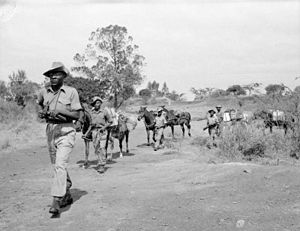Mau Mau Uprising
| ||||||||||||||||||||||||||||||||||||||||||||||||||||||||||||||||||
The Mau Mau Uprising (1952–60), also the Mau Mau Rebellion, the Kenya Emergency, and the Mau Mau Revolt, was a war in British Kenya.[B][5] The Mau Mau groups of people, politically dominated by the Kikuyu people, fought against the white European settlers in Kenya and the British Army, e.g. the local Kenya Regiment (British, auxiliaries, and pro–British Kikuyu people).[6][7]
The capture of rebel leader Dedan Kimathi on 21 October 1956 signalled the defeat of the Mau Mau, and ended the British military campaign. The Mau Mau failed to capture widespread public support,[8] partly due to the British policy of divide and rule,[9] and the movement remained internally divided, despite attempts to unify its various strands. The British, meanwhile, could draw upon the strategy and tactics they developed in putting down another rebellion in Malaya.[10]



Comments
Post a Comment